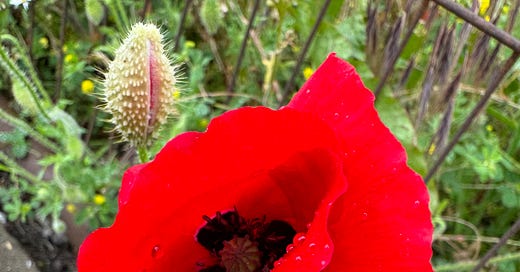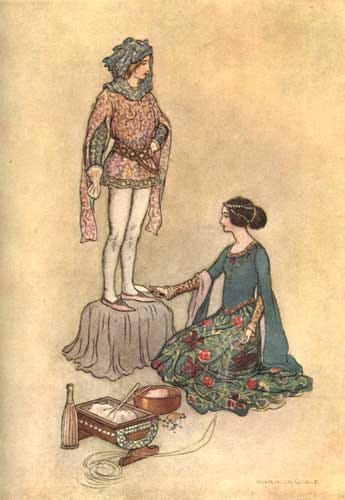From Asparagus Tarts to Marzipan Husbands
via Poppies, Stroppy Daughters, Dubious Translations and Giambattista Basile
Dearest Gentle Reader,
How lovely to write to you once more. I think I might have been suffering from a little creative block in sharing my thoughts with you. I suspect this has been exacerbated by lack of actual thought space to write. I enjoy writing when alone at home or in a space where there are people around but I don’t know anyone. Both of these situations help my writing energy. Unfortunately for various reasons, neither have been available to me for a while. I have also realised that folktales have been less a part of my life lately.
I have the luxury of the house to myself overnight for the first time in weeks and I have done the washing and brushed the cat so here I am. Is it too late to talk to you about asparagus? Have I missed my slot? I hope you will grant me a little indulgence to talk about one of my most seasonal of indulgences. My love affair with these green stalks becomes, if anything, more intense every year and long may it continue.
My first exposure this year was two big bunches to myself, don’t judge me, please. I did not intend this, they were meant to be shared but a row and some stubbornness intervened. I refused to waste them so ate both bunches with lashings of butter and shavings of parmesan. I took my time and savoured the slightly precariously balanced, large pile of precious green spears, bite by mouth-watering bite, ignoring the other party to the row as they ate oven fries and a chicken burger at the other end of the sofa. I worry that spite may have even added to the glorious flavour.
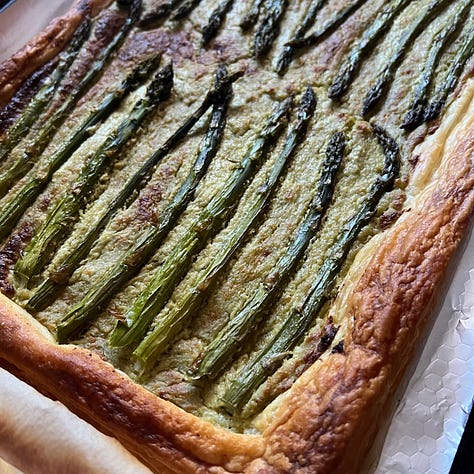
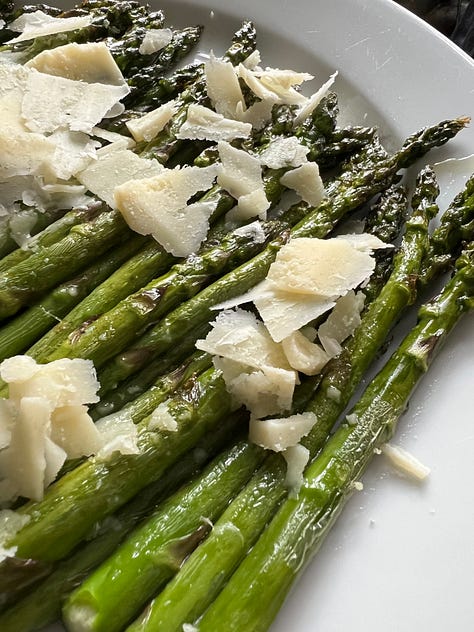

The next two asparagus experiences were shared and involved buttery puffypastry, cream cheese, pesto and more parmesan and in one case, tiny tomatoes. The resulting tarts were incredibly tasty and eating them a much more congenial experience. How is it that some foods are so photogenic? Even my impatient attempts at at food photography resulted in beautiful shots. Summer foods seem to share this trait much more than autumn and winter delights. Everywhere you look are seasonal vegetable tarts and baked, honeyed fruits or bowls of deeply pink & red berries with dollops of softly whipped cream or obscenely thick yoghurt. The weather doesn’t seem to match the foods exactly but perhaps that is why we are trying to eat in technicolour to compensate.

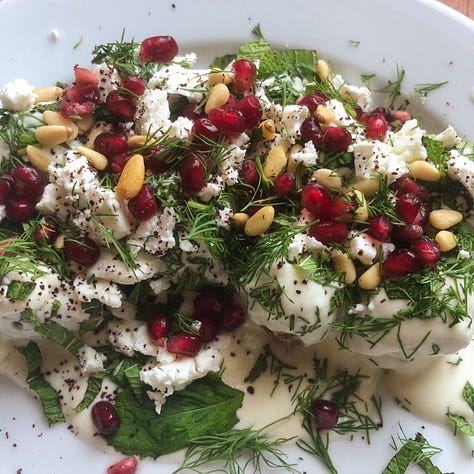
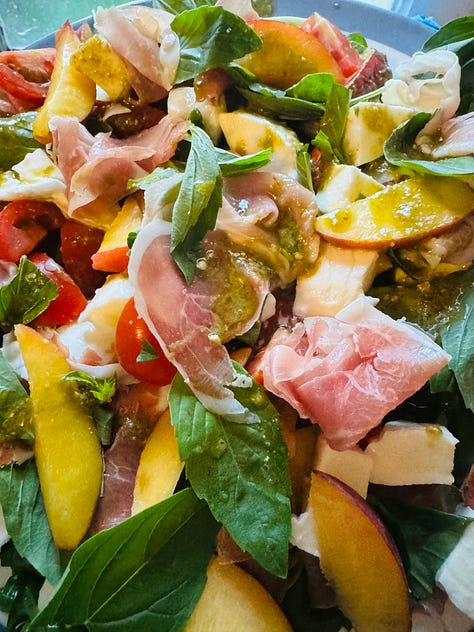



Technicolor leads me straight to my next seasonal thing, not edible this time although it has been know to have been made into a syrup for sleeplessness, or boiled in ale in Wales for the same complaint. They were traditionally a companion to corn, the flower of Aphrodite as goddess of vegetation according to the Ancient Greeks and sacred to Ceres, the corn goddess for the Ancient Romans. They often grow on battlegrounds and to some their deep, scarlet red is a visual reminder of the lifeblood that was spent there. It is no wonder they have a touch of the uncanny about them.
They are also, due to their fabulous colour, a lightning plant, with some tales telling that the picking of them could bring about a thunderstorm, whilst growing them on the roof would actually protect your home from lightning. I’m speaking of course of the red poppy. I have expounded at length on the white or opium poppy including the wild tales of the fen and the fever dreams of inhabitants of scattered, isolated, waterlogged villages so I think it is definitely the red poppy’s turn.
I don’t have the fascinating creatures of the undrained fenlands or the dubious medicinal benefits of the plant itself to assist me in defending my love for this flower in a letter that usually only values plants for their mythical, healing or favour adding properties. I hope I can beg your indulgence for a moment whilst I explain. I don’t love this one for the folklore it offers although I struggle with storms at a visceral level and once their buildup starts I count down the hours and minutes until thunder rolls or lightning strikes and the unceasing pressure headache releases.
I love them because they are so beautifully, shockingly red, the colour you would wear to dance on the grave of somebody who had wronged you deeply. Yet their petals are so delicate, tissue thin, contradicting the strength they show in their gorgeous colour. I love them because they don’t just live amongst golden fields of corn but in the abandoned, wasted spaces in the cities, where old houses once were and where plans for replacements have come to naught.
They live amongst the thistles and overgrown grasses in the central reservations and verges that remain unmowed due to council austerity cuts. They could even be said to thrive in those environments: beautiful, brave red, erupting from rusting demolition company fencing in all their delicate glory. That, simply, is what makes me love them.
They bring beauty to spaces that need every possible sign of joy and they are bloody hard to get rid off. I mourned a huge patch of them destroyed down to the soil in a cleared plot last year but they’re back this year as though the whole wilful destruction had never happened. This is almost certainly a metaphor but sadly it could be applied to too many of the events in the world we share for me to identify just one. Let’s just admire this hardy yet delicate survivor and enjoy every minute they bloom until they leave us for another year.
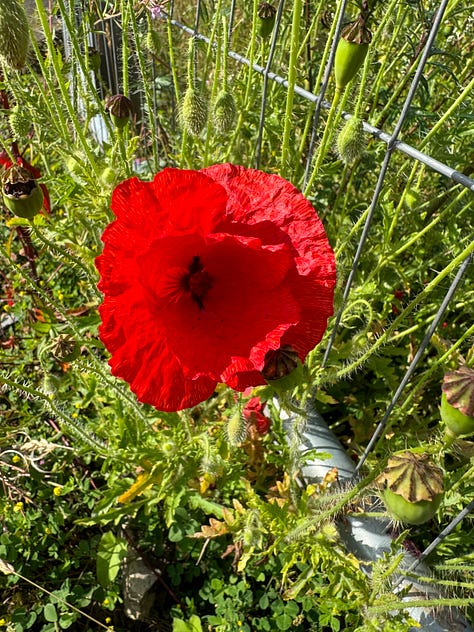
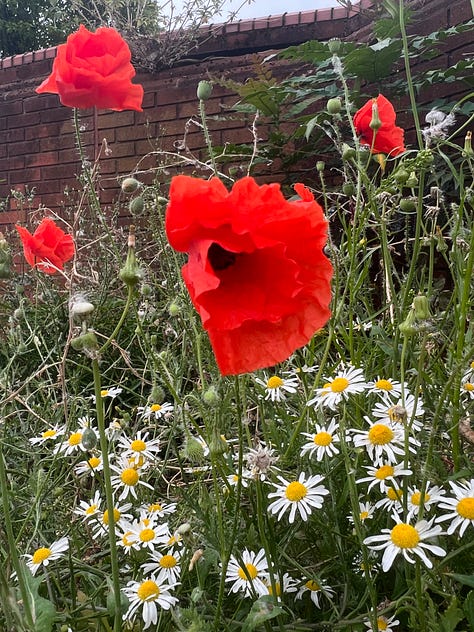
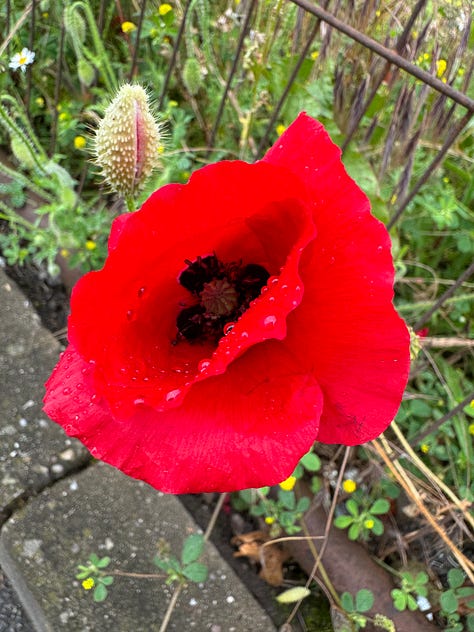
As well as not writing to you all enough, I have not spent enough time with stories lately. I found myself going off recently on an anti Grimm, pro Giambattista Basile of Tale of Tales fame, rant yesterday at a poor unsuspecting work colleague, which is unfair. You all however, signed up for folklore, food and fairytales in the form of this letter so I feel less guilty about sharing the slightly unusual story of “Pretty as a Picture’ from Basile’s Pentamerone collection with you. It predates a lot of written versions of European tales and has a strong female main character, well, as strong as female characters in the kingdoms that would eventually make up Italy are allowed to be by their patriarchal society. That is essentially showing some headstrong behaviour, not doing what their father told them without arguing and by being clever, but by the end of the tale doing what society demanded of them by settling into married bliss with babies.
This collection also contains two stories that I have explored previously on my podcast: Cat Cinderella - almost certainly a very different version than the one you know (more murder, less housework) and Two Little Pizzas where many things happen, including a capture by the king of the sea but the pizzas are actually incidental to the plot. There is also a version of the tales beautifully illustrated by Warwick Goble should you just wish to enjoy his drawings that illustrate some less well known tales.
If you can identify any elements this tale shares with a more northern tale involving a bear, don’t hesitate to share them in the comments.This tale contains ridiculous amounts of food imagery and some very odd syntax which can be blamed on the Naples dialect from which it was translated. This tale is not as, shall we say, earthy (I absolutely mean filthy here) as some of the other tales in this collection. The Victorians who translated it into English ranged from those who went along bowdlerising happily as they translated to those who couldn’t resist enhancing the more salacious parts (I’m looking at you Richard Burton). These tales were not for children then and they aren’t now. I feel like the historian Kate Lister at the beginning of her podcast ‘Betwixt the Sheets’ when I say that this collection is for adults, talking about adult things in an adult way. The themes may be universal but the language definitely isn’t.
I owe Richard Burton, Nancy Canepa, John Edward Taylor and E F Strange many thanks for their translations and versions in bringing you this story. The interesting, fantastical turns of phrase carry over from the original Neopolitan dialect that the tales were written in.
There once was a merchant who had a single, only daughter, whom he greatly wanted to see married for he feared what would happen to her after his death. But however much he pleaded, she refused him.
She banned the passage of any man through her territory as if it were a no-trespass zone or a private hunting ground: her tribunal was always closed for the holidays, her schools always on vacation, her banks always shut down for court festivities, so that her father was the most afflicted and desperate man in the world.
When he had to go to a fair one day he asked his daughter, whose name was Betta, what she wanted him to bring back for her, and she said to him, ‘My father, if you love me bring me half a quintal of Palermo sugar and the same of ambrosian almonds, with four or six flasks of scented water and a little bit of musk and amber, and also bring me about forty pearls, two sapphires, a few garnets and rubies and some spun gold, and, above all, a modeling bowl and a silver scalpel.’
Her father marveled over this extravagant request, yet so as not to contradict his daughter he went to the fair and returned with every single item she had asked for. Once she had these things she shut herself in a room and set herself to making a large quantity of almond paste and sugar mixed with rose water and perfume, and then she began to model a splendid young man, for whom she made hair from the spun gold, eyes from the sapphires, teeth from the pearls, and lips from the rubies, and she endowed him with so much grace that the only thing he was missing was speech.
After that was done, since she had heard that another statue had come alive due to the prayers of a certain king of Cyprus, she prayed to the goddess of love for so long that the statue began to open its eyes and, as her prayers became more insistent, he started to breathe, and after breath came words, and finally all of his limbs loosened up and he began to walk.
Happier than if she had acquired a new kingdom, Betta hugged and kissed him and, taking him by the hand, brought him before her father and said, ‘Daddy, my lord, you have always said that you are eager to see me married, and so to make you happy I have chosen the husband of my heart’s desire.’ Upon seeing this beautiful young man come out of his daughter’s bedroom when he hadn’t seen him go in, her father remained speechless, and when he beheld this beauty so great that he could have charged a coin a head to come and admire it,he gave his consent that the marriage take place and prepared great festivities.
Among those who showed up was a great and unknown queen, who, when she saw the beauty of Pretty as a Picture—for Betta had given him this name—became infatuated with him, and it was no laughing matter. Pretty as a Picture, who had opened his eyes to the wickedness of the world only three hours before, wasn’t yet capable of dissembling, and he accompanied the female guests who had come to celebrate the marriage to the stairs, just as his bride had told him to. As he was doing the same with the queen, she grabbed his hand and took him very quietly out to the coach-and-six that was waiting for her in the courtyard, and then she pulled him in and gave orders to leave for her own land, where that simpleton Pretty as a Picture, not understanding what had happened to him, became her husband.
After Betta had been waiting for him a while and didn’t see him come back, she sent a man down to the courtyard to see if he was talking with someone; she had another go up to the terrace to see if he had gone to get some air; she peeked into the closet to see if he had gone to pay respectful tribute to his vital needs. But then, when she couldn’t find him, she immediately imagined that, beautiful as he was, he had been stolen. After she issued the usual proclamations and no one came forth to reveal his whereabouts, she resolved to go search the world for him herself, disguised as a poor woman.
And thus she set off walking, and after several months she reached the house of a kind old woman, who received her with much affection. When she heard of Betta’s misfortune and saw that she was pregnant besides, she felt such pity for her that she taught her three little formulas: the first was ‘tricche varlacche, ca la casa chiove’ - in the house is raining’; the second, ‘anola tranola, pizze fontanola - fritters in the fountain’; the third, ‘tafaro e tammurro, pizze ’ngongole e cemmino - backsides and drums, fritters, beans and caraway-seed’; telling her to repeat these words whenever she was in trouble, and they would be of good service to her.
Betta was doubtful but nevertheless she said to herself, ‘He who blows into your mouth does not wish to see you dead, and the plant that strikes root does not wither; everything has its use; who knows what good fortune may be contained in these words?’ So saying, she thanked the old woman, and set out upon her way.
And after a long journey she came to a beautiful city called Round Mount, where she went straight to the royal palace, and begged for the love of Heaven a little shelter in the stable as she was soon to give birth. So the ladies of the court ordered a small room to be given her on the stairs; and while poor Betta was sitting there she saw Pretty as a Picture pass by, whereat her joy was so great that she was on the point of slipping down from the tree of life. But seeing the trouble she was in, Betta wished to make proof of the first saying which the old woman had told her; and no sooner had she repeated the words, "Tricche varlacche, the house rains!" than instantly there appeared before her a beautiful little coach of gold set all over with jewels, which ran about the chamber of itself and was a wonder to behold.
When the ladies of the court saw this sight they went and told the Queen, who without loss of time ran to Betta's chamber; and when she saw the beautiful little coach, she asked whether she would sell it, and offered to give whatever she might demand. But Betta replied that, although she was poor she would not sell it for all the gold in the world, but if the Queen wished for the little coach, she would have to let her sleep one night with her husband.
The Queen was amazed at the folly of the poor girl, who although she was all in rags would nevertheless give up such riches for a mere whim; however, she resolved to take the good mouthful offered her, and, by giving Pretty as a Picture a sleeping-draught, to satisfy the poor girl but pay her in bad coin.
As soon as the Night was come, when the stars in the sky and the glowworms on the earth were to start their performance, the Queen gave a sleeping-draught to Pretty as a Picture, who did everything he was told, and sent him to bed. And no sooner had he thrown himself on the mattress than he fell as sound asleep as a dormouse. Poor Betta, who thought that night to bemoan all her past troubles, seeing now that she had no audience, fell to complaining beyond measure, blaming herself for all that she had done for his sake; and the unhappy girl never closed her mouth, nor did the sleeping Pretty as a Picture ever open his eyes until the Sun appeared with the aqua regia of his rays to separate the shades from the light, when the Queen came down, and taking Pretty as a Picture by the hand, said to Betta, “So, are you happy now?”
“May you yourself have this sort of happiness for your whole life,’ Betta answered under her breath, ‘because I just spent such a dreadful night that I’m going to remember it for a few days.”
The poor girl, however, could not resist her longing, and resolved to try out the second saying; so she repeated the words, "Anola tranola, fritters in a fountain!" and instantly there appeared a golden cage, with a beautiful bird made of precious stones and gold, which sang like a nightingale. When the ladies saw this they went and told it to the Queen, who wished to see the bird; then she asked the same question as about the little coach, and Betta made the same reply as before. Whereupon the Queen, who perceived, as she thought, what a silly creature Betta was, promised to grant her request, and took the cage with the bird.
And as soon as night came she gave Pretty as a Picture a sleeping-draught as before, and sent him to bed with Betts. When Betta saw that he slept like the dead, she began again to wail and lament, saying things that would have moved a flintstone to compassion; and thus she passed another night, full of trouble, weeping and wailing and tearing her hair. But as soon as it was day the Queen came to fetch her captive, and left poor Betta in grief and sorrow, and biting her hands with vexation at the second such trick that had been played her.
In the morning when Pretty as a Picture went to a garden outside the city gate to pluck some figs, he met a cobbler, who lived in a room close to where Betta lay and had not lost a word of all she had said. Then he told Pretty as a Picture of the weeping, lamentation, and crying of the unhappy beggar-girl; and when Pretty as a Picture, who already began to question, heard this, he guessed how matters stood, and resolved that, if the same thing happened again, he would not drink what the Queen gave him.
Betta now wished to try her final formula, so she said the words, ‘tafaro e tammurro, pizze ’ngongole e cemmino - backsides and drums, fritters, beans and caraway-seed’ and instantly there appeared a quantity of stuffs of silk and gold, and embroidered scarves, with a golden cup; in short, the Queen herself could not have brought together so many beautiful ornaments. When the ladies in waiting saw these things they told their mistress, who endeavoured to obtain them as she had done the others; but Betta replied as before, that if the Queen wished to have them she must let her spend the night with her husband.
The Queen said to herself, "What can I lose by satisfying this awful girl, in order to get from her these beautiful things?" So taking all the treasures which Betta offered her, as soon as Night appeared, the debt contracted with Sleep and Rest being liquidated, she gave the sleeping-draught to Pretty as a Picture; but this time he did not swallow it, and making an excuse to leave the room, he spat it out again, and then went to bed with Betta.
Betta now began the same tune again, saying how she had kneaded him with her own hands of sugar and almonds, how she had made his hair of gold, and his eyes and mouth of pearls and precious stones, and how he was indebted to her for his life, which the gods had granted to her prayers, and lastly how he had been stolen from her, how she, big and pregnant, had gone looking for him and had encountered more hardships than the heavens usually allow baptized flesh to endure. Then, moreover, how she had slept for two other nights with him,, and for leave to do so had given up two treasures, and yet had not been able to hear a single word from him, so that this was the last night of her hopes and the conclusion of her life.
When Pretty as a Picture, who had remained awake, heard these words, and called to mind as a dream all that had passed, he rose and embraced her; and as Night had just come forth with her black mask to direct the dance of the Stars, he went very quietly into the chamber of the Queen, who was in a deep sleep, and took from her all the things that she had taken from Betta, and all the jewels and money which were in a desk, to repay himself for his past troubles.
Then returning to his wife, they set off that very hour, and travelled on and on until they were beyond the borders of the kingdom, where they rested themselves in excellent lodgings until Betta gave birth to a lovely baby boy.
When she was able to get out of bed, they set off for her father’s house, where they found him alive and well; and from the joy of seeing his daughter again he became like a boy of fifteen years. But when the Queen found neither Pretty as a Picture, nor beggar-girl, nor jewels, she tore her hair and rent her clothes, and called to mind the saying—
"She who cheats must not complain if she herself is cheated."
With this collection of slightly less connected than usual trains of thought I must now bring this letter to a close. Please don’t hesitate however, to get in touch via the comments via any of my social media profiles/my website . If you have enjoyed this and would like to read further such nonsense and have not yet subscribed, please don’t hesitate to subscribe for free at the button below. You’d be very welcome and it would be a joy to write to you.

